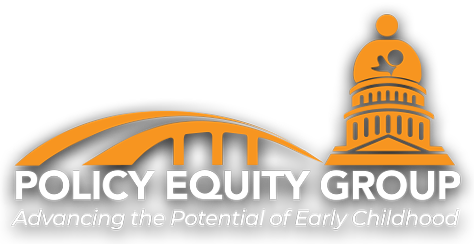Despite the fact that songs like Old MacDonald and books like Click, Clack, Moo are staples in early childhood classrooms, it seems improbable that the pending reauthorization of the Farm Bill would garner much attention within the early childhood community. And yet, we’ve been following it closely and hope you are too.
During the last eight years, we have supported the farm to early care and education (Farm to ECE) movement in numerous states and communities. We’ve been privileged to see this movement “bear fruit” as the hard work of our partners on the ground has increased access to local foods, edible gardens, and food-learning opportunities for young children and their families across the country. What is particularly remarkable about this work is that it is the product of bringing together two seemingly unrelated sectors—the food system and the child care system.
Companion Planting: The Child Care and Food Systems
The “Three Sisters” is a form of Indigenous sustainable agriculture in which corn, beans, and squash are grown together because they uniquely support each other’s growth. In a similar way, mutual benefit has always been a key tenet of farm to ECE. Connecting local farmers to ECE providers helps children, families, and ECE staff gain access to local, nutrient-dense food. At the same time, this represents a new market for farmers to leverage previously untapped financial opportunity.
Incorporating food and farm learning activities is a natural fit in early childhood, helping teachers offer the types of hands-on, multi-sensory experiences we know are key to high-quality early learning settings. But these early experiences are also essential for the future of our food system: we are raising the next generation who will have to make difficult decisions about food purchasing, practices, and policies that have implications for the ethical treatment of animals, people, and our environment.
On Common Ground
The early childhood community often talks about how “siloed” our work can be, having separate regulations, funding streams, and governance structures across child care, pre-K, Head Start, special education, and other pieces of the system. Even so, we hadn’t anticipated the challenges of bringing two separate industries together, each with their own insider nuances and jargon. Someone once joked it was like, “dumping two bowls of alphabet soup together” to keep up with all the acronyms. But over time, deep connections were formed as commonalities emerged:
- Farming and child care are often underappreciated and “invisible” professions despite their critical importance to a well-functioning society.
- Both fields are experiencing a workforce crisis as the child care industry hemorrhages staff due to poor wages and farming faces the challenges of an aging workforce and consolidation, where small farms are bought out by large businesses.
- Racial and social inequities are endemic to and perpetuated by both the child care and food systems.
As cross-sector relationships and knowledge deepened, something interesting happened: lines began to blur between “their work” and “our work.” We began to receive technical assistance requests from partners in food systems organizations about how they could approach their state’s early learning department to talk about changes to their quality rating and improvement system. Amidst the pandemic, child care and food system advocates even worked together to ensure relief dollars supported gaps in both systems.
Why the Farm Bill Matters for Child Care
As the 2023 Farm Bill is under negotiation, we are seeing another example of the lines blurring, where “their work” is “our work.” Though we often think of Farm to ECE as bringing farms into child care, there is a dire need to bring child care to farming communities. More than 75 percent of farm families with children under 18 say they struggle to access child care because of a lack of affordability, availability, or quality. The American Farm Bureau Federation, one of the largest national farm advocacy organizations, included child care as a 2023 Farm Bill priority in hopes that the bill would “increase access and incentives to provide safe and adequate child care in rural communities.”

Experiencing farm life from a child’s perspective while visiting New Roots Farm. Photo Credit: Policy Equity Group
Reporting indicates that a version of the bipartisan “Expanding Child Care in Rural America Act,” sponsored by Senator Sherrod Brown (D-OH) and Senator Roger Marshal (R-KS), could be included in the 2023 Farm Bill. The legislation would allow ECE programs, nonprofits, and businesses that want to address the lack of child care in rural areas to apply and be prioritized for Consolidated Farm and Rural Development Act grants and loans. Though the legislation would not increase funding or ultimately solve the rural or national child care crisis, it would be a step in the right direction.
Building a Bigger Room Where It Happens
Being in a room with farmers, ECE teachers, and advocates from the food and child care sectors, wondering how we could build a better world was not a room we expected to be in. But now, we don’t want to leave. And we are excited about inviting other unlikely partners into the room—not just to motivate them to help advocate for child care, but also to learn how the early childhood community can support their work and advance their goals.
We’re seeing some incredible examples of this right now, like the newly released Early Years Climate Action Plan, which brought together climate scientists and child development experts to tackle one of our biggest collective challenges. In our own work, we are striving to reach out and bring in other sectors—partnering with tech organizations to explore child care in the federal CHIPS Act; making the case that work to abolish the prison industrial complex, advocate for housing justice, and demand paid family leave is also early childhood mental health work; and convening networks where economic development organizations are involved in creating community-based child care solutions.
The most important lesson we’ve learned from our cross-sector work is that it cannot be transactional—we’ll scratch your back if you scratch ours. Rather, it must be transformational. Like the plants that protect, support, and enrich each other, our child care system will thrive when we are rooted in a model grounded in systemic mutual aid and collective action.


